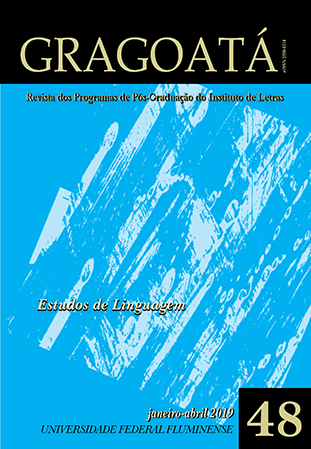Language, memory of colonization and narrativity in the 19th century
DOI:
https://doi.org/10.22409/gragoata.v24i48.33626Keywords:
National Language. Colonization Memory. Travel Reports.Abstract
This work analyzes the words discover, conquer, and barbarism, about the formulation of the first senses about the constitution of the Brazilian language and the process of scientific and territorial colonization by the European in Brazil. We cut the three definitions of different conditions of production: the first two in the Houaiss dictionary (2015) and the third in the nineteenth-century French painter and traveler diary Hércules Florence (2007), written in the nineteenth century, proposing a dialogue between the ways these words move and update the memory of European colonization in Brazil and its developments for the formation of the national language. Anchored to the assumptions of the History of Linguistic Ideas, in articulation with the Discourse Analysis, we sought to determine how the subject-colonizer relates to the Brazilian language, in its initial colonization practices, and the forms of the senses sedimented by the definitions of dictionaries.Downloads
Downloads
Published
How to Cite
Issue
Section
License
Authors who publish in Gragoatá agree to the following terms:
The authors retain the rights and give the journal the right to the first publication, simultaneously subject to a Creative Commons license CC-BY-NC 4.0, which allows sharing by third parties with due mention to the author and the first publication by Gragoatá.
Authors may enter into additional and separate contractual arrangements for the non-exclusive distribution of the published version of the work (for example, posting it in an institutional repository or publishing it in a book), with recognition of its initial publication in Gragoatá.

Gragoatá is licensed under a Creative Commons - Attribution-NonCommercial 4.0 International.














